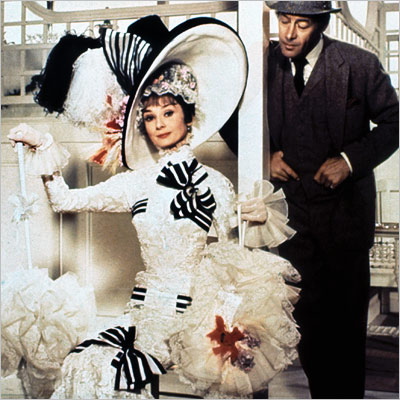 Hepburn and Harrison in My Fair Lady
Hepburn and Harrison in My Fair Lady
Film Friday
Did you know that yesterday (May 20) was Eliza Doolittle Day? I didn’t either until I heard it announced on National Public Radio. But I remembered the song from My Fair Lady once they mentioned it:
One evening the king will say:
“Oh, Liza, old thing,
I want all of England your praises to sing.
Next week on the twentieth of May
I proclaim Liza Doolittle Day!
All the people will celebrate the glory of you
And whatever you wish and want I gladly will do.”
“Thanks a lot, King” says I, in a manner well-bred;
But all I want is ‘enry ‘iggins ‘ead!”
“Done,” says the King with a stroke.
“Guard, run and bring in the bloke!”
Then they’ll march you, ‘enry ‘iggins to the wall;
And the King will tell me: “Liza, sound the call.”
As they lift their rifles higher, I’ll shout:
“Ready! Aim! Fire!”
Oh ho ho, ‘enry ‘iggins,
Down you’ll go, ‘enry ‘iggins!
Just you wait!
This gives me a chance to report on a delightful essay about the film that one of my students wrote in my Film Genre class. In the final assignment, the students were to choose a film genre, or rather subgenre, and figure out its meaning.
Laura chose the “transformation fairy tale musical” and looked at My Fair Lady, Thoroughly Modern Millie, and Grease.
Film scholar Rick Altman divides film musicals into three categories: fairy tale, stage, and folk musicals. In the fairy tale musical, the hero and heroines are the king and queen of their societies, and “restoring order to the couple accompanies and parallels restoration of order to an imaginary kingdom..” Altman notes that the central themes of the fairy tale musical are usually romance and love, with the couple initially set against each other: “instead of pitting the lovers as a unity against an enemy who is ridiculous,” Altman writes, “the fairy tale musical typically places an obstacle within each lover, in the form of pride or vanity.” By the end, however, order is restored.
The reason why women like herself often love transformation musicals, Laura writes, is because it allows them to escape the constraints of society.
Laura remembers playing these songs full blast on the stereo when she was a girl cleaning the family bathroom with her sister. “Belting these songs out, we were suddenly transformed into a different person at a different time,” she remembers. “We were Julie Andrews or Audrey Hepburn. . . “my ‘good girl’ behavior was transformed and liberated by the women of these musicals. Suddenly I was a daring, fearless young woman.”
Musicals are sometimes dismissed as escapist entertainment, but I always tell my students that escapism is more complex that it is given credit for. For one thing, whatever one wants to escape from (or more accurately, learn how to handle) will show up in the film. In My Fairy Lady, we see Eliza bullied by Higgins, submerged in a bath tub, hooked up to a “torture device” in order to practice her vowels, and then insensitively ignored by the two men following her triumph. Laura is struck by how “only in the safe environment of a fairy tale can women loudly express anger and frustration” (as in the “Just You wait” number). She notes that “these musicals are classics because they dared to step outside the box and showed females expressing emotions previously denied them.”
That being said, however, all troubles vanish in the fairy tale ending. Laura has a historical explanation for this. Pointing out that the film appeared in 1964, she writes,
The success of the movie could be attributed to the beginning of the women’s liberation movement in the sixties. The release of The Feminine Mystique (1963) and the Equal Pay Act of 1964 allowed women to begin to see themselves as liberated individuals. However, since the movement was just starting, the end of My Fair Lady was appropriate for the audience because they weren’t ready to expose themselves and completely deny their ‘housewife’ role just yet.
Another student, Kelsey, propounded a similar reading of burlesque musicals which, like Laura’s transformation musicals, provide her a sense of liberation. Her musicals pick up where Laura’s leave off, however. Cabaret, Moulin Rouge, and Chicago feel freer to acknowledge women’s darker sides—the rejection of a quiet married life in Cabaret, the raw celebration of female anger in Chicago’s “He Had It Coming.”
“Just You Wait” was probably inspired by Bertolt Brecht’s and Kurt Weil’s “Pirate Jenny” song from Three Penny Opera (1928). As a Marxist, Brecht could see the submerged anger in working class women and offered them a voice. Brecht himself probably enjoyed how George Bernard Shaw’s Pygmalion (the basis for My Fair Lady) went after bourgeois platitudes in 1913, so it all comes full circle.
Who knew that such rebellious sentiments would still strike a chord in young women growing up in the 1990’s? We shouldn’t forget about Eliza Doolittle Day just yet.